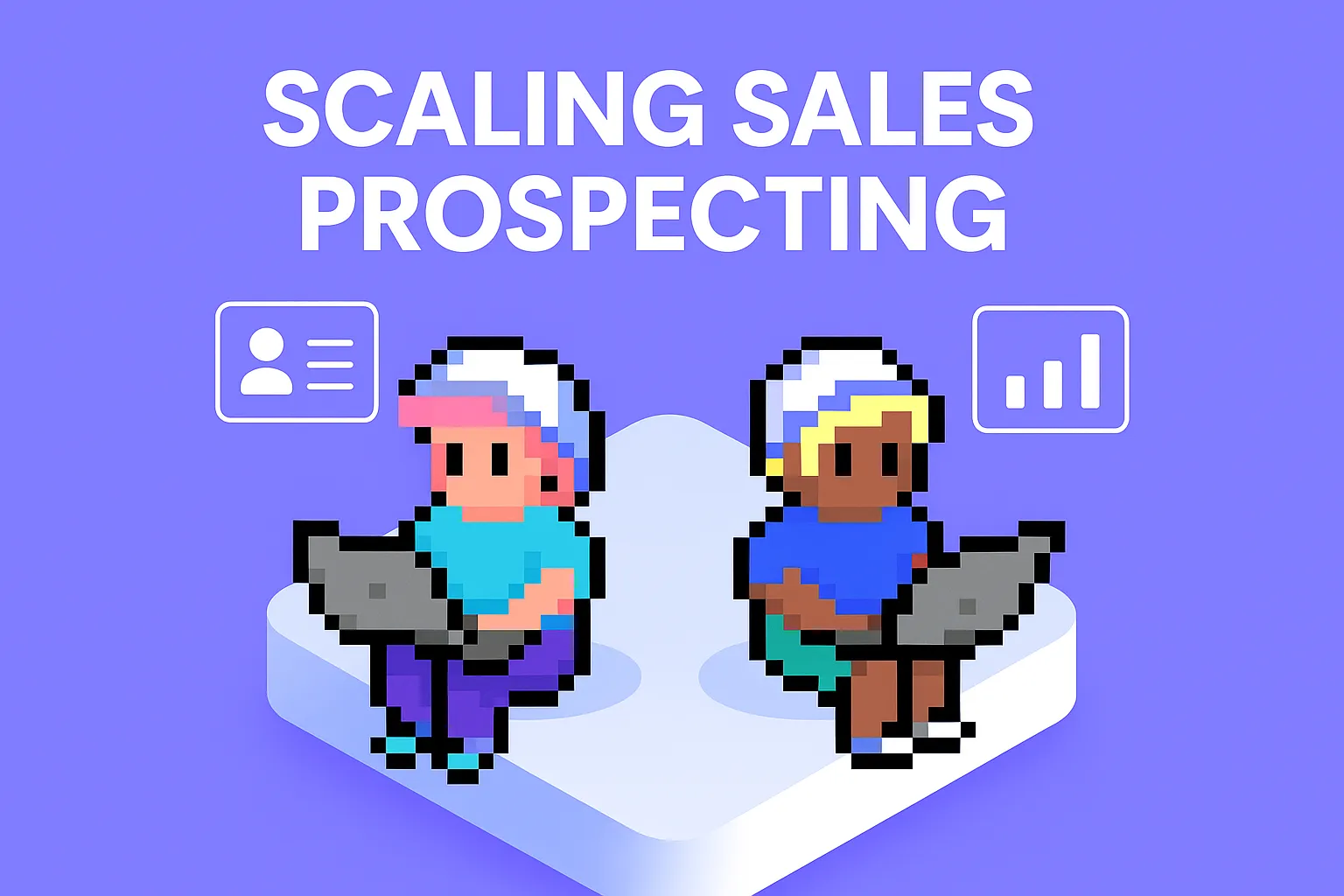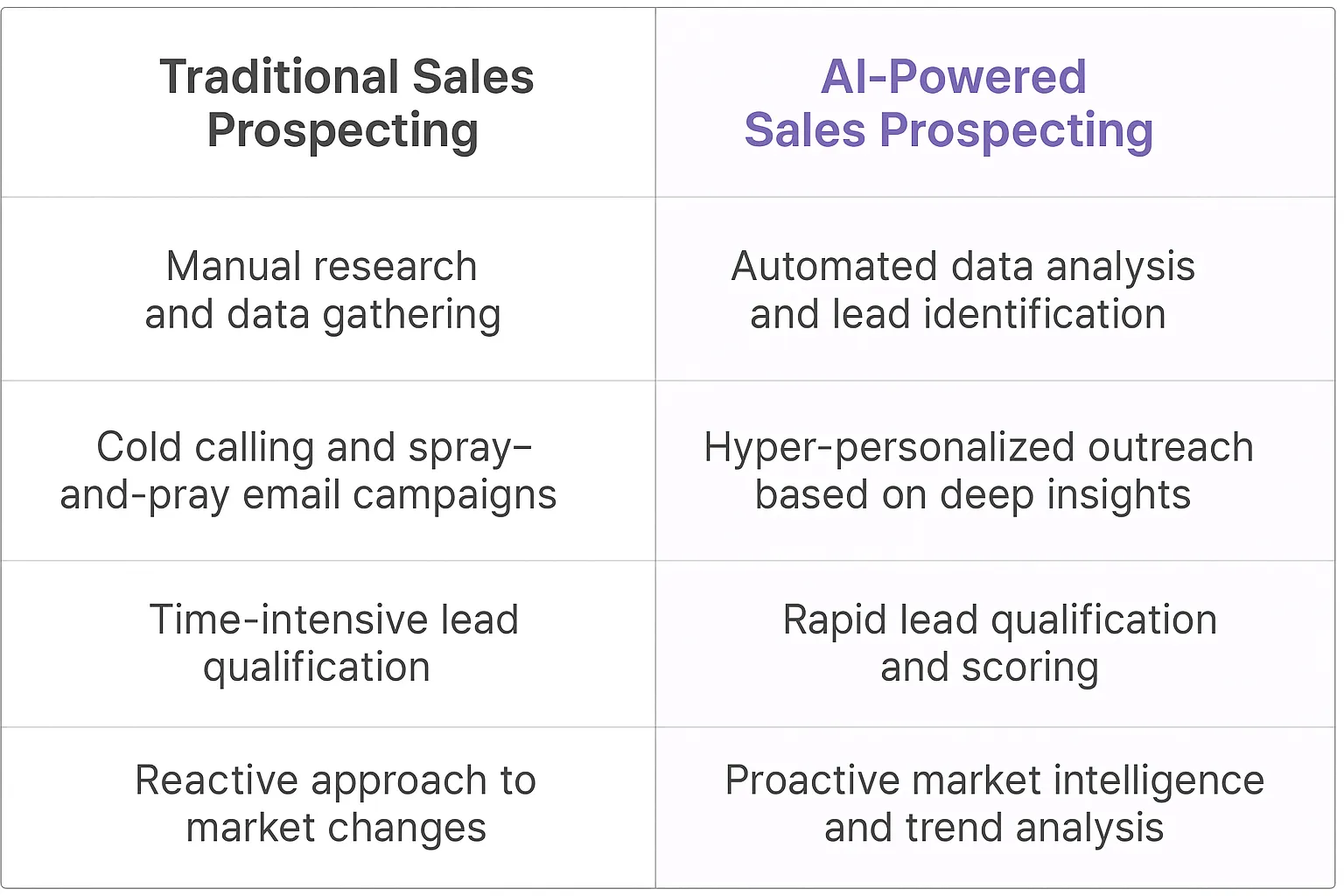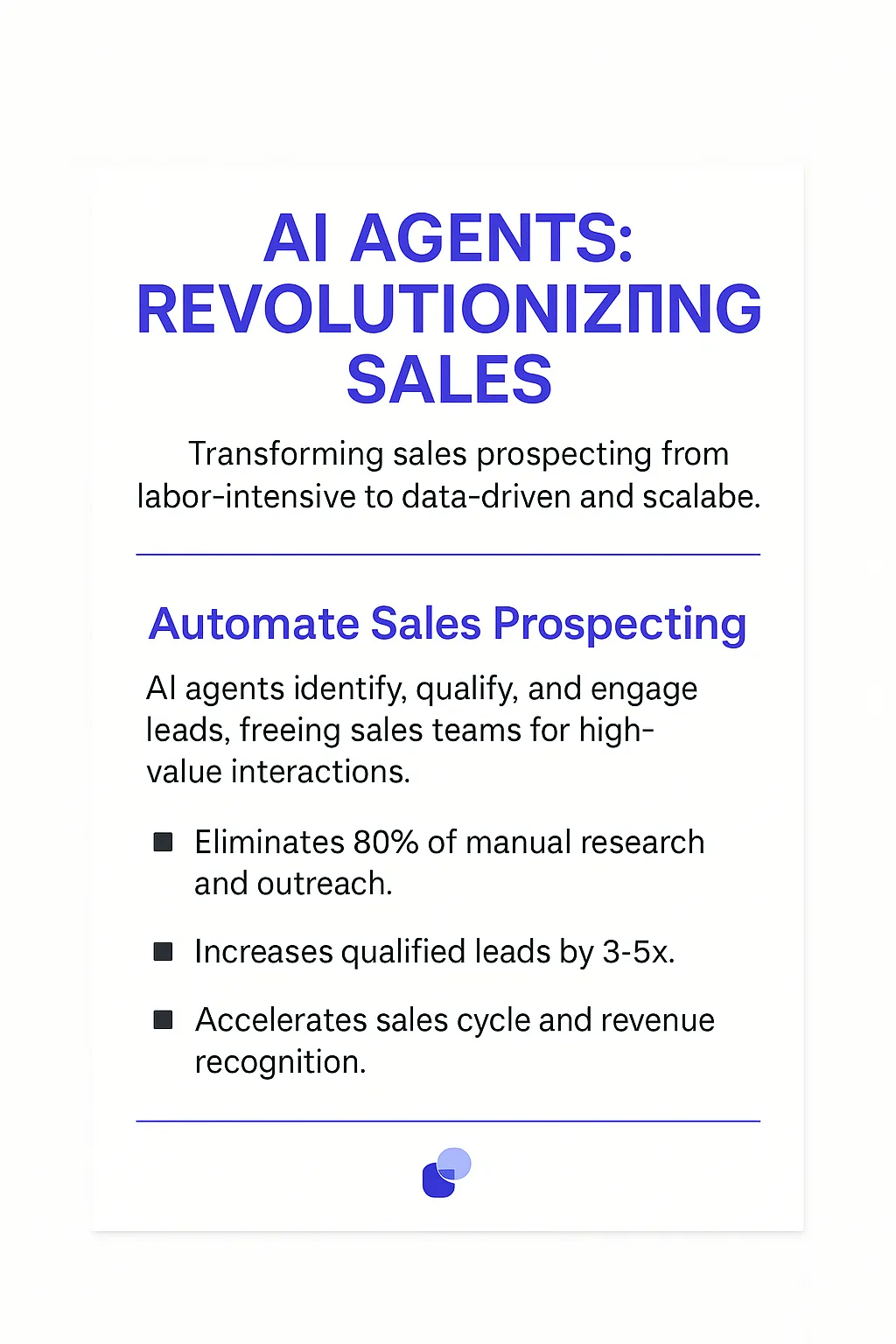Sales Prospecting AI Agents
The Evolution of Sales Prospecting with AI Agents
What is Sales Prospecting?
Sales prospecting is the process of identifying and engaging potential customers for a product or service. It's the crucial first step in the sales pipeline, where businesses seek out individuals or organizations that might benefit from their offerings. Traditionally, this involved cold calling, email outreach, and manual research - a time-intensive and often hit-or-miss approach.
Key Features of Sales Prospecting
Modern sales prospecting, powered by AI agents, has evolved to include:1. Data-driven lead identification: AI analyzes multiple data sources to pinpoint high-potential prospects.2. Hyper-personalization: Outreach is tailored based on deep insights into each prospect's needs and behaviors.3. Automated engagement: AI manages initial contact and follow-ups across multiple channels.4. Continuous learning: The system refines its approach based on success rates and feedback.5. Scalability: AI enables teams to dramatically increase their prospecting efforts without proportional increases in manpower.

Benefits of AI Agents for Sales Prospecting
What would have been used before AI Agents?
Before AI agents entered the sales prospecting game, we were stuck in a world of manual grunt work and educated guesswork. Sales teams relied on a mishmash of LinkedIn stalking, cold calling, and spray-and-pray email campaigns. It was like trying to find a needle in a haystack, except the haystack was the entire internet and the needle was a qualified lead who might actually want to talk to you.
The old-school approach involved SDRs spending hours combing through company websites, social media profiles, and industry reports to piece together a semi-coherent picture of potential prospects. Then came the tedious task of crafting personalized outreach messages, often based on surface-level information. It was a numbers game where quantity often trumped quality, leading to burnout and missed opportunities.
What are the benefits of AI Agents?
Enter AI agents for sales prospecting, and suddenly we're playing a whole new ballgame. These digital teammates are like having a team of super-smart, tireless researchers and strategists working 24/7 to uncover golden opportunities.
First off, AI agents can process and analyze vast amounts of data at lightning speed. They're sifting through news articles, company filings, social media activity, and more to identify not just potential leads, but leads that are actually primed for your solution. It's like having a crystal ball that shows you which companies are experiencing pain points your product can solve.
But it doesn't stop at lead identification. These AI agents are getting scary good at understanding context and nuance. They can craft hyper-personalized outreach messages that resonate on a deeper level than your typical "I noticed you're the VP of X" opener. We're talking about messages that reference recent company initiatives, industry trends, or even personal interests of the prospect that are relevant to your offering.
The real game-changer, though, is how AI agents are enabling sales teams to scale their efforts without sacrificing quality. They're not replacing human salespeople; they're amplifying their capabilities. Imagine an SDR who can now focus on high-value interactions and relationship-building because an AI agent has handled the initial research and outreach groundwork. It's like giving every salesperson a team of invisible assistants.
Moreover, these AI agents are learning machines. They're constantly refining their approach based on what works and what doesn't. This means your prospecting strategy is always evolving, always improving. It's like having a sales playbook that rewrites itself to be more effective with every interaction.
In the end, AI agents for sales prospecting aren't just about finding more leads or sending more emails. They're about fundamentally changing the quality and efficiency of the entire sales process. They're turning the art of sales prospecting into a science, without losing the human touch that closes deals. And for companies that get on board early, it's going to be a massive competitive advantage in a world where everyone's fighting for attention.

Potential Use Cases of AI Agents for Sales Prospecting
Processes
Sales prospecting is ripe for AI-driven transformation. Digital teammates can augment human capabilities across the entire prospecting funnel, from initial research to follow-up. They're not just tools; they're force multipliers that can dramatically expand a sales team's reach and effectiveness.
One key process where AI shines is lead qualification. Instead of sales reps spending hours sifting through databases, AI agents can rapidly analyze vast amounts of data to identify high-potential leads. They can cross-reference company information, social media activity, and industry trends to create a prioritized list of prospects most likely to convert.
Another critical process is personalized outreach at scale. AI can draft customized email templates or social media messages that resonate with each prospect's specific needs and pain points. This level of personalization, when done manually, would be prohibitively time-consuming. With AI, it becomes not just possible, but effortless.
Tasks
Breaking down the sales prospecting process into discrete tasks reveals even more opportunities for AI integration. Here are some high-impact areas where digital teammates can make a significant difference:
- Data enrichment: AI can automatically fill in missing information about prospects, from job titles to recent company news, ensuring sales reps always have the most up-to-date and comprehensive information.
- Meeting scheduling: AI agents can handle the back-and-forth of finding suitable meeting times, integrating with calendar systems and even learning individual preferences over time.
- Follow-up management: AI can track interactions, set reminders, and even draft follow-up messages, ensuring no promising lead falls through the cracks.
- Competitive intelligence gathering: AI can monitor competitor activities, pricing changes, and market shifts, providing sales reps with valuable insights to inform their pitches.
- Objection handling preparation: By analyzing past interactions and industry trends, AI can predict likely objections and prepare tailored responses, arming sales reps with the information they need to close deals.
The key to unlocking the full potential of AI in sales prospecting isn't just about automating tasks—it's about augmenting human capabilities. When AI handles the time-consuming, data-heavy aspects of prospecting, sales reps are freed up to focus on what they do best: building relationships and closing deals.
As these AI agents become more sophisticated, we're likely to see a shift in the skills required for sales roles. The most successful sales teams will be those that can effectively collaborate with their digital teammates, leveraging AI insights to inform strategy and execution.
The future of sales prospecting isn't human vs. machine—it's human and machine working in concert to achieve unprecedented levels of efficiency and effectiveness. Companies that embrace this paradigm shift early will have a significant competitive advantage in the evolving sales landscape.

Industry Use Cases: AI Agents in Sales Prospecting
AI agents are reshaping sales prospecting across industries, and their impact is far from a one-size-fits-all approach. These digital teammates are proving to be game-changers, adapting to the unique challenges and opportunities each sector presents. Let's dive into some concrete, industry-specific examples that illustrate how AI is transforming the prospecting landscape.
From tech startups to established financial institutions, AI agents are becoming indispensable partners in identifying, engaging, and nurturing potential clients. They're not just automating tasks; they're augmenting human capabilities, allowing sales professionals to focus on high-value activities that truly move the needle.
What's particularly exciting is how these AI agents are learning and evolving alongside sales professionals, creating a symbiotic relationship that's pushing the boundaries of what's possible in sales prospecting. The following use cases demonstrate the versatility and power of AI in action, showcasing how different industries are leveraging this technology to gain a competitive edge in their prospecting efforts.
Real Estate: Transforming Property Prospecting with AI
The real estate industry is ripe for disruption, and AI-powered sales prospecting is the bulldozer that's about to reshape the landscape. Think about it: agents spend countless hours sifting through leads, most of which end up being dead ends. It's like panning for gold in a river of pebbles.
Enter AI sales prospecting agents. These digital teammates are the equivalent of having a team of seasoned real estate agents working 24/7, but without the coffee breaks or commission splits. They can analyze vast amounts of data - property listings, market trends, social media activity, and even satellite imagery - to identify high-potential leads with surgical precision.
Imagine an AI agent that can predict which homeowners are likely to sell in the next six months based on factors like life events, property age, and neighborhood dynamics. It's not just about finding leads; it's about finding the right leads at the right time. This isn't just incremental improvement; it's a quantum leap in efficiency.
But here's where it gets really interesting: these AI agents don't just find leads; they nurture them. They can engage in personalized, context-aware conversations across multiple channels, answering questions about local schools, property values, or mortgage rates. They're essentially creating a warm introduction for human agents, who can then step in to close the deal.
The result? Real estate agents can focus on what they do best - building relationships and closing deals - while their AI teammates handle the grunt work of prospecting. It's not about replacing human agents; it's about amplifying their capabilities and letting them operate at the top of their license.
This isn't some far-off future; it's happening now. The real estate firms that embrace this technology will have a massive competitive advantage. Those that don't? Well, they might find themselves as outdated as a fax machine in a WeWork.
E-commerce: AI-Driven Customer Acquisition in the Digital Marketplace
The e-commerce landscape is a battlefield, and customer acquisition is the ultimate prize. But let's face it, most online retailers are still using tactics from the Stone Age of digital marketing. They're throwing spaghetti at the wall and hoping something sticks. Enter AI sales prospecting agents - the secret weapon that's about to turn the entire industry on its head.
These digital teammates are like having an army of data scientists, behavioral psychologists, and master salespeople rolled into one, working tirelessly to identify and engage potential customers. They're not just crunching numbers; they're decoding the DNA of consumer behavior.
Here's where it gets interesting: AI agents can analyze a user's browsing history, purchase patterns, social media activity, and even contextual data like weather and local events to predict not just what they might buy, but when they're most likely to buy it. It's like having a crystal ball, but one powered by petabytes of data and machine learning algorithms.
But prediction is just the beginning. These AI agents can craft personalized outreach campaigns that make traditional segmentation look like a blunt instrument. We're talking about hyper-personalized product recommendations, tailored pricing strategies, and perfectly timed offers that feel less like marketing and more like mind-reading.
And here's the kicker: these AI agents learn and improve with every interaction. They're constantly refining their models, adapting to changing consumer preferences, and staying ahead of market trends. It's not just about keeping up; it's about setting the pace.
The implications are massive. E-commerce businesses can dramatically reduce customer acquisition costs while simultaneously increasing conversion rates and lifetime value. It's like finding a cheat code for growth.
But let's be clear: this isn't about replacing human creativity or strategic thinking. It's about freeing up human marketers to focus on big-picture strategy and brand building while the AI handles the heavy lifting of data analysis and personalization at scale.
The e-commerce companies that embrace this technology will be the ones writing the playbooks for the next decade of digital retail. Those that don't? They'll be the Blockbusters in a Netflix world, wondering where all their customers went.
Considerations
Technical Challenges
Implementing a Sales Prospecting AI Agent isn't just about plugging in some fancy algorithm and watching the leads roll in. It's a complex dance of data, integration, and machine learning that can make even seasoned tech veterans break out in a cold sweat.
First up, data quality. Your AI is only as good as the data it's fed. If you're pumping in stale contacts or incomplete company profiles, you're essentially asking your digital teammate to build a skyscraper with Lincoln Logs. It needs rich, real-time data to work its magic.
Then there's the integration headache. Your AI needs to play nice with your CRM, your email platform, your social media accounts, and probably a dozen other tools in your tech stack. It's like trying to get a group of toddlers to form a synchronized swimming team – possible, but not without some tears and tantrums.
Let's not forget about the AI's learning curve. These digital teammates aren't born knowing how to prospect like a seasoned sales vet. They need time to learn your industry, your ideal customer profile, and the nuances of your sales process. It's like training a new hire, except this one never sleeps and can process information at the speed of light.
Operational Challenges
On the operational side, things get even trickier. You're essentially asking your sales team to trust a robot with one of their most crucial tasks. It's like telling a chef to let a machine season their signature dish – there's going to be some pushback.
Change management becomes your new best friend (or worst nightmare, depending on how you look at it). You need to convince your team that this AI isn't here to replace them, but to make them superhuman. It's about augmenting their skills, not making them obsolete.
Then there's the question of how to measure success. Sure, you can look at the number of leads generated, but what about quality? How do you quantify the AI's ability to identify prospects that are more likely to convert? It's not just about volume; it's about finding that sweet spot where quantity meets quality.
And let's talk about the elephant in the room – ethics. As your AI gets better at identifying and targeting prospects, you're walking a fine line between personalization and privacy invasion. You need to set clear boundaries and ensure your AI respects them, or you risk turning potential customers into privacy advocates.
Implementing a Sales Prospecting AI Agent is like trying to tame a wild stallion while riding it. It's exhilarating, potentially game-changing, but not without its risks and challenges. But for those who can pull it off, the rewards can be astronomical. Just remember, in the world of AI-powered sales, the early bird gets the worm, but the second mouse gets the cheese.
The Future of Sales: AI and Human Synergy
AI agents are not just changing the game in sales prospecting; they're rewriting the rules entirely. By automating the data-heavy grunt work and providing deep, actionable insights, these digital teammates are freeing up human sales professionals to do what they do best: build relationships and close deals. The companies that embrace this technology now will have a significant edge in the increasingly competitive sales landscape.
But here's the kicker - this isn't about replacing humans with machines. It's about creating a symbiotic relationship where AI insights and human intelligence complement each other. The most successful sales teams of the future will be those that can effectively leverage AI insights while maintaining the human touch that ultimately seals the deal.
As we move forward, the line between human and AI capabilities in sales prospecting will continue to blur. The question isn't whether to adopt AI in your sales process - it's how quickly you can integrate it to stay ahead of the curve. In the end, AI in sales prospecting isn't just a tool; it's becoming the new playing field. And in this game, the early adopters aren't just winning - they're changing the definition of what winning looks like.













